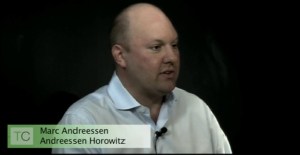 One of the more surprising things that came out of our all-star panel of consumer software VCs was an admission that Marc Andreessen is starting to invest in a new wave of enterprise software companies. He said he’d just closed one deal he couldn’t disclose, and was expecting to do more.
One of the more surprising things that came out of our all-star panel of consumer software VCs was an admission that Marc Andreessen is starting to invest in a new wave of enterprise software companies. He said he’d just closed one deal he couldn’t disclose, and was expecting to do more.
I talked with Andreessen briefly afterwards about his comment, asking if he meant software-as-a-service specifically and whether he meant niche products or core software for running big businesses. His answer was ‘all of the above’, if it’s the right company — he thinks it’s time for an industry reset. Oracle’s – and to a far lesser degree SAP’s – shopping sprees of the past few years have cleaned out most of the late 1990s enterprise software brush and most big businesses rely on one or both of the big vendors, with no best-of-breed competitors mixed in and very little in the way of new products and real innovation.
Corporate America’s rush to get with the modern times in the 1990s lead to a surge in enterprise software buying and several multi-billion dollar companies – Oracle, Siebel, PeopleSoft, BEA Systems et al. But growth slowed once most corporations had those systems, and consolidation set in.
Meanwhile, there haven’t been many challengers coming out of the Valley. Thousands of software-as-a-service and open source companies were started over the last decade to upend the category with cheaper, more flexible pay-as-you-go offerings that didn’t involve the multi-million-dollar installation costs of hardware and customization. These companies were cheaper for venture capitalists to build and could get to millions in revenue quickly, but building a big company has been all but impossible: Salesforce.com still is one of the only billion dollar annual revenue businesses among the entire crop. And since software has long been the most dominant category of venture capital investment and returns, that’s weighed heavily on the asset class.
If Andreessen is right and corporate America is ready for a computing restart, the Valley could be on the cusp of better times indeed. Unlike new media and Web 2.0 companies, enterprise software has a great business model: Companies pay millions for the software. But with Wall Street obsessed with cutting capital expenditures and boosting margins the onus will be on the startups to prove they have a next generation product worthy of the pain of a corporate upgrade.
Here’s the video… (transcript below)
Mr. ARRINGTON: What investments do you have coming up that you haven’t announced?
Mr. HORNIK: Right, what are those?
Mr. ANDREESSEN: Oh, for example, we are very, very interested and active right now in the enterprise software and a very large number of professional investors think enterprise is dead and, you know, we just think that is absolutely not the case.
Mr. ARRINGTON: It certainly isn’t as fun as FourSquare.
Mr. ANDREESSEN: Well – so there are some incredibly high quality entrepreneurs, we just – it’s not been announced – but we just backed an incredibly high quality entrepreneur. With a great track record…
Mr. HORNIK: Someone who is awesome.
Mr. CONWAY: Can we co-invest?
Mr. ANDREESSEN: He’s building a fantastic – he’s building what’s going to be a great – he’s going into a huge market, you know, going up against incumbents, you know, all the incumbents in the space have been bought by the likes of Oracle and… he’s going up against, you know, incumbents that are not going to make the shift to the next generation nearly as aggressively as he is and there’s all kinds of market demand for this and numerous companies. But none of us are ever going to use the product – it’s not that kind of product.
Mr. HORNIK: Well, this is the thing – right, actually, one of my most interesting companies right now is this company Splunk, which is a search engine for your data center. Does anyone have any idea what Splunk is? No, but on the other hand, it’s pretty exciting.